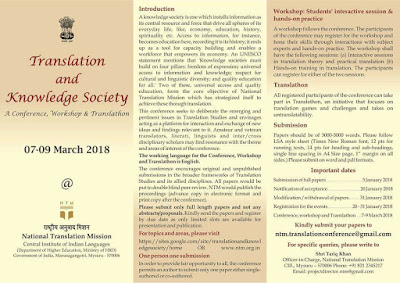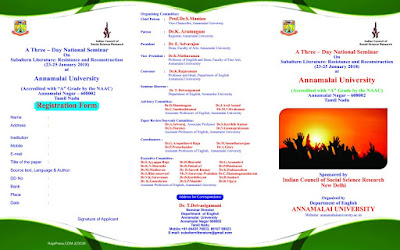THE ENGLISH AND FOREIGN LANGUAGES UNIVERSITY
HYDERABAD
Department of Indian and World Literatures
International Conference on
Indian Literature as World Literature: Past, Present, Future
18
to 20 January 2018
In recent
years Indian Literature in English has been generating renewed interest in its
writers and writings not just among students and scholars of literature but
also intellectuals and thinkers working in other areas of Humanities and Social
Sciences. There has also been a huge global increase in sales of literary works
produced by Indian writers living in India as well as writers of Indian origin
living outside the country. This new era in Indian Writing, as we all know, was
ushered in by the epic-success of Salman Rushdie’s Midnight’s Children published
in 1981. Today, interestingly, many of the works published in the 80s and 90s,
especially Rushdie’s own magnum opus, Arundhati Roy’s The God of Small
Things and Aravind Adiga’s The White Tiger and others feature on the
reading lists of departments of World Literature in universities across the
globe.
Not very long
ago, classical literatures of India produced over the last two millennia, had
generated a similar interest among scholars of British India. English
translations of The Rāmāyaṇa, The Mahābhārata, Pañcatantra, Kathāsaritsāgara, Jātaka
Tales, Abhijñānashākuntala, Raghuvaṃśa, Mṛcchakaṭika, Svapnavāsavadattam, Harṣacarita,
Pṛthvīrāj Rāso and Padmavat began to come into the public domain as early as
the last quarter of the 1800s and after. The contribution of indologists and
translators like Ralph Griffith, Arthur Ryder, E. B. Cowell, Charles Henry
Tawney, Sir William Jones and others in the preservation and dissemination of
India’s most loved classical texts across the limits and boundaries of the
ancient languages is unquestionably one of the most important milestones in the
journey of Indian literatures. Sadly, however, these extraordinary texts, or at
least parts of them, despite their incomparable literary quality and universal
appeal have rarely been featured on reading lists of World Literature
departments.
The fate of
literatures produced in the regional languages of India has not been very
different. Most of the literature produced in Hindi, Bengali, Tamil, Kannada,
Telugu, Malayalam and a host of other languages has to a large extent remained
unknown both to readers outside the language of its origin as well as to the
English-speaking world simply for lack of translation across languages within
India and of course, into English. Can an understanding of World Literatures
ever be complete without having known the worlds of Kalidas, Kabir, Meera, Mir
Taqi Mir, Mirza Ghalib, Kaifi Azmi, Gulzar, Sri Sri, Gurram Jashuva, Kuvempu,
Premchand, Sarat Chandra Chatterjee, Nirala, Sumitranandan Pant, Maithili
Sharan Gupt, Bhisham Sahni and O V Vijayan, to name a few?



















